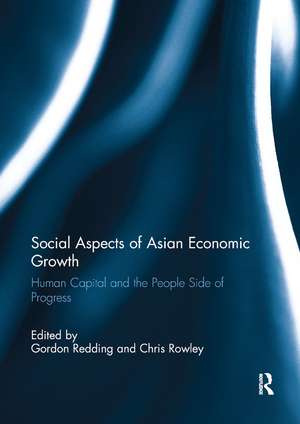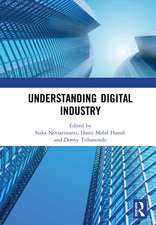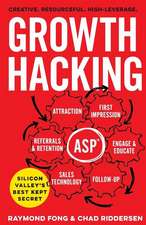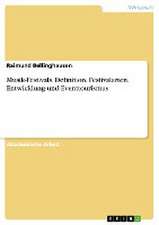Social Aspects of Asian Economic Growth: Human capital and the people side of progress
Editat de Gordon Redding, Chris Rowleyen Limba Engleză Paperback – 17 dec 2019
| Toate formatele și edițiile | Preț | Express |
|---|---|---|
| Paperback (1) | 175.76 lei 6-8 săpt. | |
| Taylor & Francis – 17 dec 2019 | 175.76 lei 6-8 săpt. | |
| Hardback (1) | 496.94 lei 6-8 săpt. | |
| Taylor & Francis – 21 noi 2017 | 496.94 lei 6-8 săpt. |
Preț: 175.76 lei
Preț vechi: 214.12 lei
-18% Nou
Puncte Express: 264
Preț estimativ în valută:
33.63€ • 35.96$ • 28.04£
33.63€ • 35.96$ • 28.04£
Carte tipărită la comandă
Livrare economică 17 aprilie-01 mai
Preluare comenzi: 021 569.72.76
Specificații
ISBN-13: 9780367892180
ISBN-10: 0367892189
Pagini: 164
Dimensiuni: 174 x 246 x 16 mm
Greutate: 0.3 kg
Ediția:1
Editura: Taylor & Francis
Colecția Routledge
Locul publicării:Oxford, United Kingdom
ISBN-10: 0367892189
Pagini: 164
Dimensiuni: 174 x 246 x 16 mm
Greutate: 0.3 kg
Ediția:1
Editura: Taylor & Francis
Colecția Routledge
Locul publicării:Oxford, United Kingdom
Public țintă
Postgraduate and UndergraduateCuprins
Introduction: human capital as a factor in societal progress 1. The Indonesian tourism industry under crisis: a Bourdieuan perspective on social boundaries among small-scale business owners 2. Design leadership, work values ethic and workplace innovation: an investigation of SMEs in Thailand and Vietnam 3. The war for talent: human capital challenges for professional service firms 4. Human capital issues and government responses to climate change in Mekong Delta, Vietnam 5. Collaboration and opportunism as a duality within social capital: a regional ethnic Chinese case study 6. Human capacity development in Indonesia: leadership and managerial ideology in Javanese organizations 7. Human capital formation under neo-liberalism: the legacy of vocational education training in Australasia and implications for the Asia-Pacific region 8. Conclusion: the central role of human and social capital
Notă biografică
Gordon Redding is a specialist in comparative management, who has spent 28 years in Asia studying its management systems, teaching, and writing, based both at the University of Hong Kong, and at INSEAD. He is the author of The Spirit of Chinese Capitalism (1990), co-author of The Future of Chinese Capitalism (with Michael Witt, 2007), and co-editor of The Oxford Handbook of Asian Business Systems (with Michael Witt, 2014).
Chris Rowley is a Visiting Fellow at Kellogg College, University of Oxford, and Professor Emeritus in the Cass Business School, City, University of London, UK. He has published widely, with over 600 articles, books, chapters and pieces in the areas of human resource management and Asian business. He also edits four journals and three book series, as well as regularly providing expert comments and quotes in the media.
Chris Rowley is a Visiting Fellow at Kellogg College, University of Oxford, and Professor Emeritus in the Cass Business School, City, University of London, UK. He has published widely, with over 600 articles, books, chapters and pieces in the areas of human resource management and Asian business. He also edits four journals and three book series, as well as regularly providing expert comments and quotes in the media.
Descriere
Most international business practice involves the mixing together of cultures, and business success demands an appreciation of the influences of culture on behaviour. This book exposes the workings of this ‘human capital’ in a variety of Asian business environments. It was first published as a special issue of the Asia Pacific Business Review
























